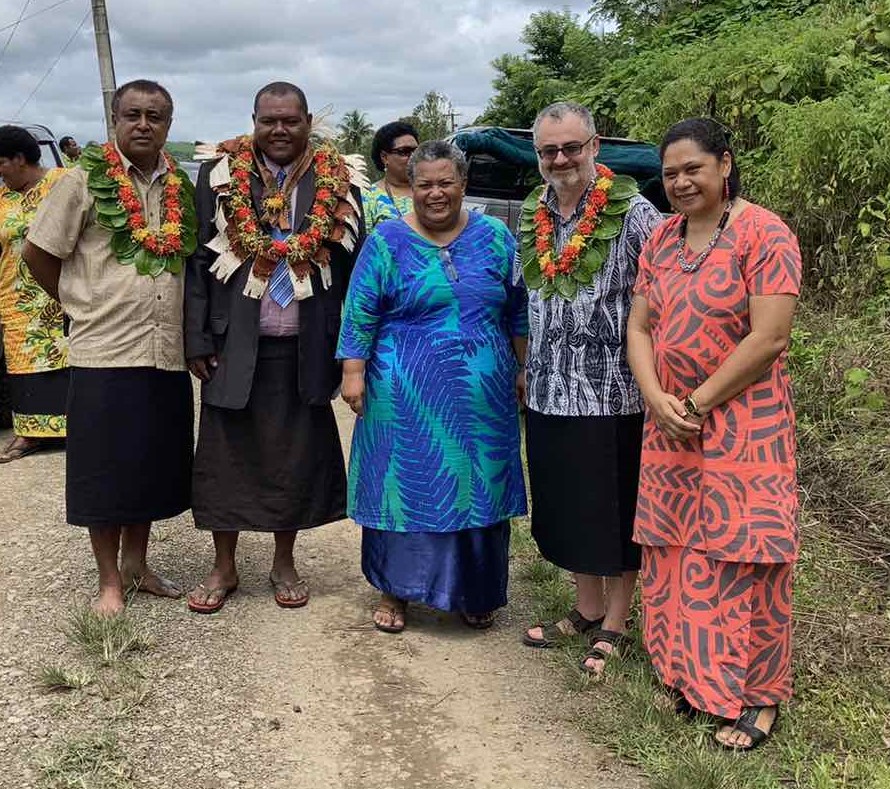
Communities to Benefit from Forest Restoration and Rehabilitation Efforts
Seventeen (17) communities living
along the Tuva Catchment which spans across the Provinces of Ba and
Nadroga/Navosa will soon benefit from forest restoration and rehabilitation
efforts through a project recently launched by the Minister for Forestry, Honourable
Osea Naiqamu.
Minister Naiqamu was at Nasovatava Village in Nadroga/Navosa on Thursday 28 January, 2021 to launch this project which falls under the Global Environment Facility (GEF) 5 Ridge to Reef (R2R) approach to Preserve Ecosystem Services, Sequester Carbon, Improve Climate Resilience and Sustainable Livelihood as implemented across 6 catchments in Fiji - including the Tuva Catchment.
The Tuva Catchment has a total land area of 25,780 hectares with mixed tenure and the most common land use is noted to be forestry – predominantly pine plantations (45%), agriculture – sugar cane (10%) with sporadic small scale cash crop subsistence farms.
In the recent published Biodiversity Rapid Assessment, the Tuva Catchment is reported to be a highly degraded catchment that needs to be restored. It is critically important for ecological health and resilience, environmental services, socio-economic, cultural, touristic and marine significance.
Minister Naiqamu thanked the community of Tuva as well as the Nadroga/Navosa Provincial administrator and the Nadroga/Navosa Yaubula Management Support Team (YMST) for their unwavering support and effective coordination of the project.
He also thanked the United Nations Development Program (UNDP), Conservation International (CI), Ministry of Waterways and Environment, Fiji Pine Trust and the University of the South Pacific for their support in the implementation of the project that will improve the management of the Tuva catchment.
Minister Naiqamu said the natural Tuva Catchment eco-system has been severely reduced and modified through human related activities like forest clearing through logging, agriculture, silviculture, indiscriminate burning, overgrazing, invasive alien species taking over the landscape and other development activities.
He added given the type of landownership that we have, stakeholder collaboration and a great deal of understanding is central to addressing forest related issues.
“This presents an opportunity to apply large landscape intervention across the island of Viti Levu, supporting and connecting restoration efforts across the provinces of Ba and Nadroga/Navosa, which supports parallel national efforts in the provinces of Tailevu, Ra, Namosi, Serua and Naitasiri,” which collectively contributes to the national initiative of 30 million trees in 15 years, he said.
The project aims to plant 3 million trees in villages along the Tuva Catchment by 2026 which according to Minister Naiqamu will complement Fiji’s national 30 Million Trees in 15 Years tree planting revolution.
“We started well in 2019, planting one million trees in 10 months. In 2020, working in partnership with the Fiji Pine Group of Companies and other stakeholders, more than four million trees was planted in 12 months across Fiji.
“This is a significant achievement and complements our efforts to address Climate Change and also enhance socio-economic development. It is also a major step towards the work being done in Tuva,” Minister Naiqamu said.
Fiji, he continued is endowed with extensive forest resources that provide important environmental, social and economic benefits. The wise use of these resources is essential if their multiple values are to be maintained for the benefit of future generations.
“Government has been allocating funds on an annual basis of up to $0.5million to focus on reforestation and forest protection activities,” Minister Naiqamu said.
“This includes awareness and training programmes to forest owning communities for them to make better management decisions with regards to the utilization, protection and conservation of their forest resources.”
Minister Naiqamu added that Fiji is fortunate in having over half of it’s the total land area –covered with forests which are home to a diversity of plant and animal life, most of which are endemic to Fiji.
“Fiji is privileged to have international, regional and local organisations who work closely with Government to support policy and national initiatives through knowledge creation and awareness to enable better landuse practices through all levels of governance.
The UNDP Resident Representative to Fiji Mr Levan Bouadze commended the efforts of Conservation International and Government’s support in restoring and rehabilitating degraded areas.
“We need to ensure that eco-systems that have been degraded over the years are restored to some degree thus allowing for its sustainable use,” Mr Bouadze said.
CI Regional Director Mrs Susana Tuisese thanked UNDP for their cooperation and support in the transfer of grants to facilitate activities out in the field.
“Through workshops and discussions with communities, the planting at Nasovatava Village will closely follow restoration plans that have been endorsed by stakeholders.
“Our forests provide many key eco-systems services for us in Fiji as well as contributing to the global fight against Climate Change”, she said.
Minister Naiqamu reiterated that Government on behalf of all Fijians is committed to fighting Climate Change as it threatens Fiji’s security of natural resources and the safety of its people at large.
“The effects of Climate Change include much stronger and more frequent cyclones than ever before, in addition to more severe droughts and flooding events. Therefore, I urge everyone to commit themselves to reducing deforestation, preventing forest degradation and promoting sustainable livelihoods through climate smart actions that address resilience, adaptation and mitigation issues.”
Minister Naiqamu said the land’s potential to support biodiversity increases when the land can support more life.
“The resilience of the land to Climate Change increases when there is a greater diversity of native species that live in the area. This biodiversity gives us a wider resource base to adapt to whatever changes might come our way – from cyclones to pandemics. We do not know what it might be, but we need to be prepared.”
With similar work being carried out in five other catchments around Fiji, Minister Naiqamu reiterated that trees and forests are to be loved, protected, nurtured and enhanced for what they are and celebrated for all that they freely offer.